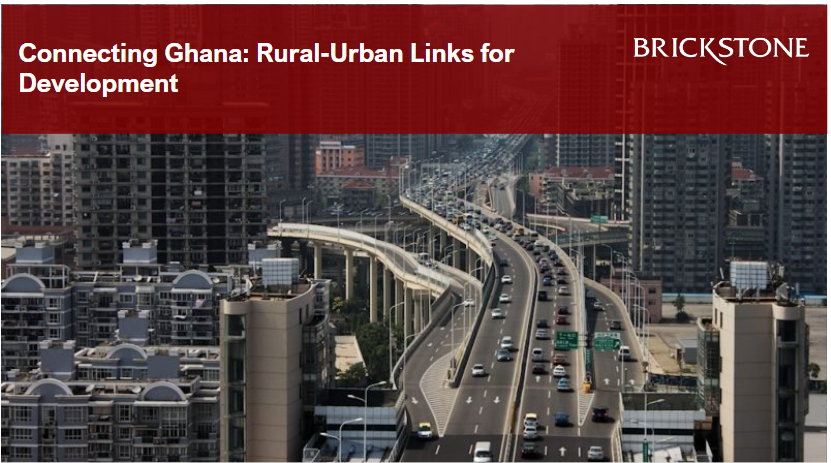Connecting Ghana: Rural-Urban Links for Development
Connecting Ghana: Rural-Urban Links for Development
The article, Why Linking Rural and Urban Areas Matters for Development: A Ghana Case Study, delves into the importance of creating strong connections between rural and urban areas to foster sustainable development. Using Ghana as a case study, the article illustrates how the dynamic relationship between these regions plays a crucial role in improving livelihoods, driving economic growth, and addressing social inequalities. The piece focuses on how stronger linkages between rural and urban regions can enhance development outcomes by encouraging resource flow, improving access to services, and creating opportunities for economic diversification.
One of the key arguments made in the article is that the traditional view of development, which tends to treat rural and urban areas as separate entities, is outdated and limiting. Development policies that focus solely on either rural or urban areas often miss the bigger picture—how these regions are interconnected and reliant on each other for overall growth. The article emphasizes that rural-urban linkages can boost development by facilitating the movement of goods, services, people, and information between these regions. This relationship, when well managed, can lead to improved market access for rural producers, more efficient labour markets, and greater innovation through knowledge sharing.
The article presents findings from a study conducted in Ghana, where rural-urban interactions have significantly impacted both regions’ development trajectories. In particular, it highlights how rural producers benefit from access to urban markets. Farmers in rural Ghana can sell their produce in urban centres, where demand is higher, thereby increasing their incomes. On the other hand, urban areas depend on rural regions for food and raw materials, creating a mutually beneficial relationship. However, these connections are not automatic and require proper infrastructure, policy support, and investment to flourish.
Transportation networks, particularly roads, are highlighted as a critical factor in facilitating rural-urban linkages. The article discusses how poor infrastructure in Ghana, especially in rural areas, hampers the movement of goods and people between regions, limiting the potential for rural producers to access urban markets. Improving infrastructure—roads, communication networks, and transport systems—would greatly enhance the integration of rural and urban economies, fostering trade and making it easier for rural residents to access education, healthcare, and other essential services available in cities.
The article also touches on the role of migration in strengthening rural-urban linkages. Migration is a key element in the rural-urban dynamic, with many individuals moving from rural areas to cities in search of better economic opportunities. The piece notes that this movement of people can drive development if managed properly. Migrants often send remittances back to their rural hometowns, providing financial support for their families and communities. Moreover, the skills and knowledge gained by migrants in urban areas can be transferred back to rural regions, further contributing to development. However, migration can also have negative effects, such as overpopulation and pressure on urban infrastructure, which must be addressed through balanced policies.
An important point raised in the article is the concept of “rural-urban divides” and the need to bridge these divides to achieve inclusive development. Rural areas are often left behind in terms of infrastructure, education, healthcare, and economic opportunities. The article argues that integrating rural areas into broader development strategies is essential to achieving the Sustainable Development Goals (SDGs) and reducing poverty and inequality. In Ghana’s case, policies that encourage rural-urban cooperation have shown promise in reducing these gaps, but much work remains to be done.
The article also explores the significance of economic diversification in both rural and urban areas as a way to strengthen rural-urban linkages. In Ghana, rural areas tend to rely heavily on agriculture, while urban areas are more diversified. Promoting non-agricultural activities in rural areas—such as agro-processing, manufacturing, and services—can create jobs, reduce poverty, and lessen the dependence on agriculture. Similarly, fostering innovation and diversification in urban centres can create new markets and opportunities for rural products, encouraging a symbiotic economic relationship.
Another takeaway from the article is the importance of governance in managing rural-urban linkages. The piece stresses that policies aimed at bridging the rural-urban divide must be inclusive and well-coordinated across different levels of government. Local authorities, regional governments, and national policymakers must work together to ensure that rural and urban areas are integrated into development plans. In Ghana, there have been some successful initiatives, such as decentralization policies that empower local governments to make decisions that benefit both rural and urban areas. However, the article notes that more can be done to create a cohesive national strategy that leverages the strengths of both rural and urban regions
In conclusion, Why Linking Rural and Urban Areas Matters for Development: A Ghana Case Study offers valuable insights into the benefits of rural-urban linkages for sustainable development. It shows that by strengthening these connections, countries like Ghana can improve livelihoods, reduce poverty, and promote economic growth in both rural and urban regions. The article calls for investments in infrastructure, inclusive policies, and economic diversification to foster these linkages, ensuring that development benefits all regions and people. It is an important read for policymakers, development practitioners, and researchers interested in rural development, urbanization, and sustainable development strategies.
This article by Brickstone reviews the conversation’s publication on Why Linking Rural-Urban Areas Matters for Development: A Ghana Case Study.
Read the complete publication here.





